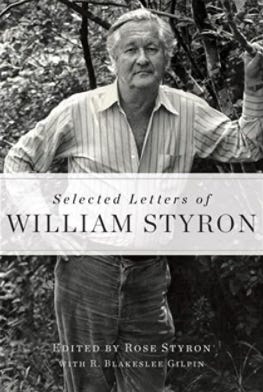Those golden words turn to dust
You can support this newsletter by becoming a paying subscriber for a few pounds per month, by donating, or simply by sharing it with friends. It all helps. Thanks!
I’m currently, after years of delay, reading Selected Letters of William Styron, and as imagined, it’s a gem. His letters brim with insight, wisdom, wit, and very often frustration—many written with such eloquence that I can’t help but feel jealous. At some point in the not-too-distant future I’ll hopefully delve deeper and write properly about this book, but in the meantime here are just a few excerpts from some of the many pages I’ve bookmarked so far.
Especially during wartime, as I am beginning to find out, the futility of writing, art, of most everything—becomes more apparent. As you said, there is a story around every corner, and I see a million potential stories around me all the time. Now the crux of the situation lies in the fact that, to the writer, war is a gigantic, inexorable, relentlessly terrible panorama which, although at every hand fraught with mists of beauty and pathos, swirls about him so swiftly and chaotically that he is unable to find a tongue to utter his thoughts. And after the war, if he has extricated himself from the whole mess with a sound mind and body, he is usually so terribly cynical and embittered that those golden words turn to dust. To be platitudinous, it changes one’s viewpoint immensely. Like Wolfe’s Eugene Gant I see “Time, dark time, flowing by me like a river”—and that is all one can say.
William Styron | Letter to his father | 14 Feb 1945
It’s incredible how one runs about frantically at times like a rat in a maze, not really knowing right from wrong (and often really not caring), victim of one’s own passions and instincts rather than master of one’s own soul. I suppose the proper thing to do is just to stop every now and then and say, Where am I heading? Actually, though I’m still much like the psychologist’s rat, I find myself asking myself that question almost too often. I suppose the very fact that I realize my indulgence in too much introspection is another sign (I hope) of maturity. Too much brooding is unhealthy and, although I still have my slumps, I’ve begun to realize that one of the great secrets is striking a balance between thought and action. Between the Romantic and the Classical. Just living healthily. Living, acting, thinking; not just vegetating neurotically, on one hand, or blundering about, on the other hand, like so many people do, like trapped flies. It’s a hard balance to strike, but I think it can be done, and that in this exciting-sorrowful age of ours it can make great literature.
William Styron | Letter to his father | 31 Mar 1949
I think that any writer who ever lived, who was any good at all, has had long long periods of precisely the same sort of strain and struggle that both you and I are going through; I only comfort myself (and God knows it seems like forlorn comfort at times) that it seems to be true that often such periods of doubt and thrashing around eventually produce the best work. They often eventually produce the best work because it is during such periods of struggle (when one is long unpublished or goes through long periods of tortured sterility) that a writer really suffers. A lot of crap has been written about suffering, and the value of it, and in about two seconds I’ll shut up, but every now and then, even in the midst of my most dried-up, sterile depressions, I have a crazy confused moment of joy in the knowledge that anything good I ever did seemed at one time or another impossible of attaining, that it was a hard struggle in getting it out, that it seemed at times to be crushed under the weight of my doubts about it, but if it happened to be good at all it was because of the doubts, and perhaps a little suffering.
William Styron | Letter to Mac Hyman | 15 Aug 1953
As for your existential “wrassling,” I’m sure that I don’t have to tell you that your pondering and wondering and troubling are only extensions of what people have been doing ever since they had the capability of thought, which is to say hundreds of thousands of years. Gods and the idea of a God were of course born out of just this troubled pondering, so it may or may not be a consolation to you that your intense wonder and turmoil about the meaning of the human condition is, in fact, a part of the human condition—or at least as it is experienced by sensitive and questing souls like yourself (no joke). It may just be that there is no reason or purpose to existence. Many great men—thinkers and artists—have thought this to be true, yet have not despaired over this assumption but have created great work through their very vision of mankind enduring triumphant over the sheer purposelessness of the universe, and in spite of the bleak and soulless aspect it so often presents. The whole concept of tragedy is of course embodied in this notion.
William Styron | Letter to his daughter | 15 May 1972
Support this newsletter:



